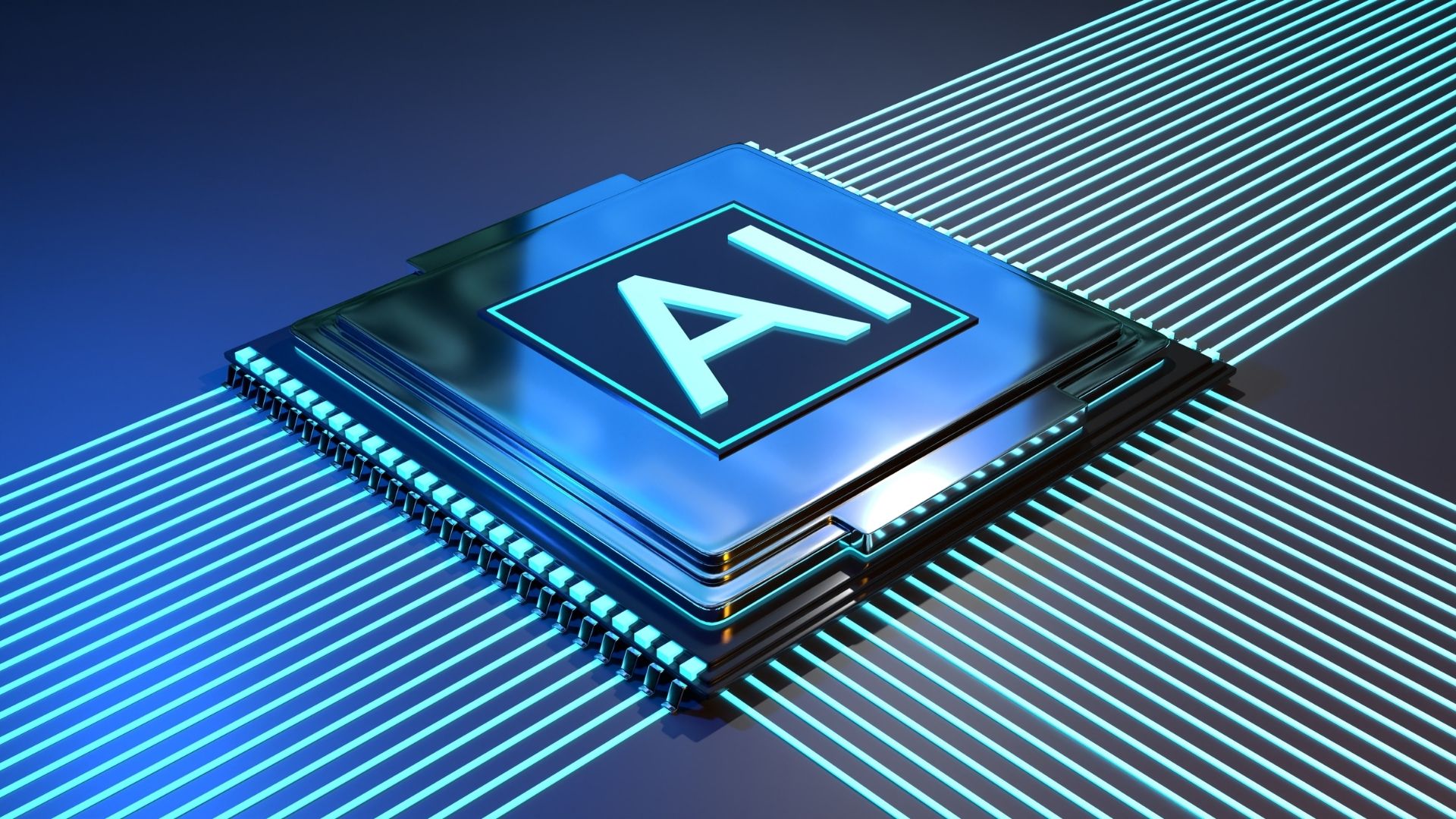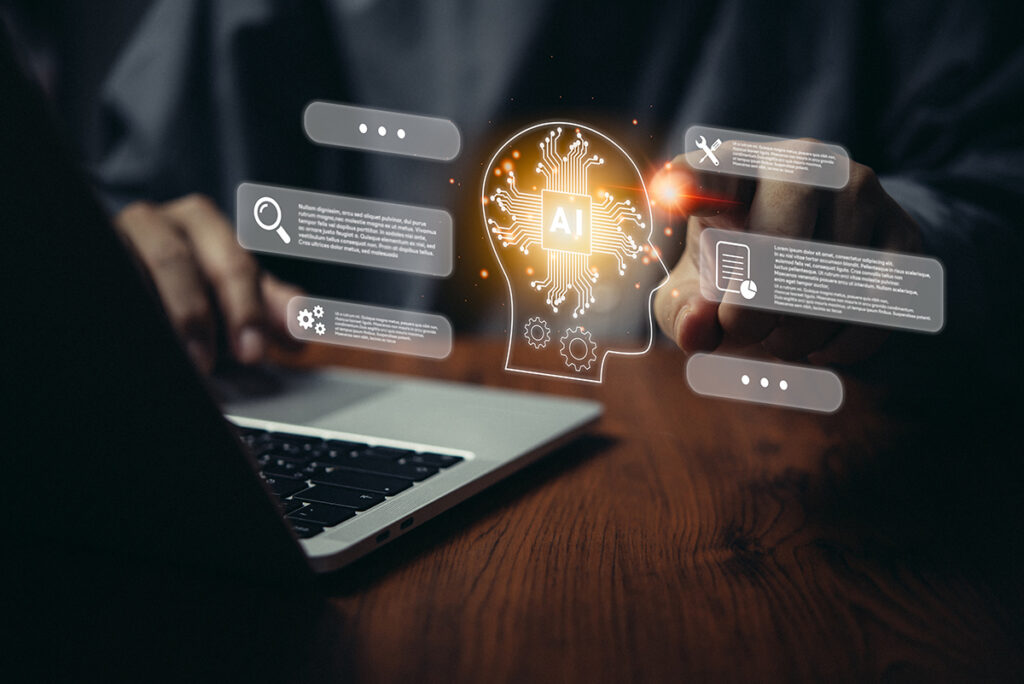Unlock the Potential of AI Automation for Business Success
AI Automation: The Untapped Power Reshaping Business
Imagine having an indefatigable, infallible assistant at your beck and call around the clock—this is what AI automation offers. Well, welcome to the world of AI automation.
A realm where mundane tasks vanish into thin air. Where your business operates with unparalleled efficiency, it’s not magic—it’s technology.
In this voyage through the AI universe, we’ll navigate through its impact on business processes—how they’re streamlining operations and boosting productivity at light speed.
We’ll also explore how it’s enhancing customer experiences in ways previously unimaginable. And don’t worry—we won’t ignore potential pitfalls either—from labor market disruptions to data security challenges.
So fasten your seatbelt for an exciting journey that promises a new understanding of our automated future!
Table Of Contents:
- AI Automation: The Untapped Power Reshaping Business
- Decoding the Mechanics of AI Automation
- Unveiling the Power of AI Automation in Business Processes
- AI Automation: The New Frontier in Customer Experience Enhancement
- The Role of Natural Language Processing in AI Automation
- Building Custom Solutions with AI Automation
- The Future Potential of AI in Different Industries
- Mastering AI Automation for Peak Efficiency
- Navigating the Challenges & Opportunities in AI Automation
- Unveiling the Role of Data Scientists in AI Automation
- FAQs about AI automation
Decoding the Mechanics of AI Automation
One must recognize artificial intelligence’s (AI) transformative power in online business building.
By utilizing this technology, companies can automate tedious jobs and make it easier to make decisions, resulting in significant improvements to operational productivity.
The Triad Powering AI Automation
A closer look at intelligent automation (IA) reveals it as a crucial element in contemporary business process management (BPM). IA amalgamates three main components: AI, BPM, and robotic process automation (RPA). The interplay between these elements allows optimized operations and improved enterprise decision-making capabilities.
“Intelligent Automation, as defined by IBM, is an integration that births systems capable of learning from data inputs. These systems then leverage this knowledge to adapt their actions.”
Artificial Intelligence: Machine learning algorithms sit at the heart here; they enable computers to learn from experience without being explicitly programmed. They use neural networks designed after human brain functions, which pave the way for deep learning – a subset focused on handling large datasets.
BPM: Business Process Management encapsulates all activities related to running a business, including modeling, analyzing, and improving or maintaining them. It works harmoniously with intelligent automation by identifying what needs automation within a company’s workflow while ensuring smooth operation.
RPA: Robotic Process Automation employs software robots or ‘bots’ to automate routine tasks previously carried out by humans, such as entering data into spreadsheets or responding to simple customer inquiries. This frees up staff time for more complex issues requiring human intervention.
Unveiling the Power of AI Automation in Business Processes
When discussing transforming business landscapes, one must recognize the role of Artificial Intelligence (AI) automation. It is not just a buzzword but an active agent driving change by automating repetitive tasks and boosting productivity.
1. Repetitive Tasks? Let AI Take Over
The magic begins when you let AI take over mundane, time-consuming activities that often slow down your workflow. From data entry to customer service inquiries – these are all handled quickly and precisely thanks to advanced algorithms.
Public spending on labor markets has shown how industries like call centers have significantly improved operations due to chatbots handling routine queries. This allows human staff more time for complex issues that need their expertise.
2. Internal Processes Get a Boost, Too
Apart from tackling monotonous tasks, AI shines at improving internal processes, too. Machine learning algorithms and predictive analytics help businesses identify patterns and trends humans might miss.
This proactive approach paves the way for better decision-making across various sectors within an organization – whether it is sales forecasting or inventory management – ultimately leading to strategic growth while reducing unnecessary costs.
3. Skyrocketing Productivity Growth With Advanced Tech Adoption
Last but certainly not least is the effect on productivity growth rates as businesses adopt this revolutionary technology. Studies suggest that integrating such sophisticated tools could lift global economies beyond current expectations – marking a paradigm shift in performance standards industry-wide.
- Boost efficiency by delegating routine workloads to automated systems.
- Improve internal processes through intelligent analysis and insights.
- Experience unprecedented productivity growth via the adoption of advanced technologies.
In short, harnessing artificial intelligence automation presents an opportunity for more intelligent, faster, more accurate business processing. Businesses that embrace this revolution stand poised at a competitive advantage today and tomorrow.
Key Takeaway:
AI automation is a game-changer in the business world. It takes over tedious tasks, freeing time for more complex issues and boosting productivity.
Its intelligent analysis enhances internal processes, while its adoption propels productivity growth to new heights. Embracing AI automation puts businesses on the fast track to success.
AI Automation: The New Frontier in Customer Experience Enhancement
Businesses are upping their ante in the digital age, utilizing AI systems to refine customer experience and bolster overall customer interaction on their sites.
They use AI systems to improve the customer buying experience and boost general customer interaction on their platforms. IBM explains more about this exciting development.
“With AI, businesses can provide a personalized shopping journey by understanding individual preferences.”
The Impact of AI on Customer Interactions
Chatbots have emerged as powerful tools for enhancing real-time interactions with customers. But that’s not all.
- They handle questions promptly.
- Offer tailored product suggestions based on user interests.
- Free up human staff for tasks requiring more profound expertise.
“Predictive analytics driven by machine learning help anticipate consumer behavior.”
This means analyzing past purchases and interactions to predict future needs or tastes – an invaluable tool for crafting effective marketing strategies.
Beyond User Journey: Additional Benefits of Implementing AI Systems
Not only does integrating an AI system enhance the user journey, but it also offers numerous other benefits:
- Simplifies internal processes like inventory management or data analysis.
- It frees up significant workforce resources.
- Lower error rates than manual handling—increasing accuracy while reducing costs associated with fixing mistakes.
In short, if you want your business operations to run smoothly and efficiently while providing top-notch customer service experiences at every touchpoint, consider investing in Artificial Intelligence technology.
The Role of Natural Language Processing in AI Automation
NLP revolutionizes AI, enabling machines to understand a human conversation and interact with us. This technology bridges the gap between human conversation and machine understanding, creating an interactive environment.
With NLP, machines are no longer mere tools; they’re partners capable of interpreting our words just as another person would.
Thanks to this remarkable tech, they can sift through sentences, identify critical elements like subjects or actions, and understand context.
IBM’s Watson Assistant, for instance, leverages NLP capabilities to engage customers in real-time chats, mimicking human responses with surprising accuracy. It’s a game-changer for businesses looking at automation solutions.
Natural Language Processing: The Future Is Here
Machines have come a long way from simple tools that perform tasks on command. Now, they comprehend complex sentence structures and respond appropriately.
Chatbots powered by NLP offer efficient round-the-clock support in customer service scenarios while accurately mimicking human interactions.
This breakthrough isn’t limited to customer service; it’s transforming various industries. MastermindWebinars.com, for example, uses AI-driven content creation tools that leverage NLP technology to generate SEO-optimized copy efficiently.
Beyond Comprehension: Sentiment Analysis Unleashed
- Fostering Better Interactions Through Understanding Emotions.
- Sentiment analysis is where the true potential of NLP lies – enabling machines to understand what we say and how we feel when saying it. Imagine a business tapping into this level of emotional comprehension – the sky’s the limit. A computer system capable of gauging user sentiments provides crucial insights about their preferences, which could be used effectively to enhance customer interaction significantly.
Building Custom Solutions with AI Automation
The business world is evolving rapidly, thanks to the rise of Artificial Intelligence (AI) and automation. Businesses now have a golden opportunity to build custom solutions that cater to their unique needs.
1. Harnessing Machine Learning Algorithms for Business Growth
In today’s data-centric environment, machine learning algorithms are game-changers.
Machine learning algorithms enable businesses to examine large quantities of data and uncover essential knowledge that can be used to construct solutions tailored to their particular needs.
MastermindWebinars.com offers training modules explicitly designed around online business building using advanced technologies like AI and machine learning.
These modules provide practical guidance along this journey, ensuring successful implementation at every step.
2. The Potential Of Tailored AI Automation
A standard approach often needs to be revised to meet diverse business requirements.
That’s where customized AI automation comes into play – allowing firms to develop bespoke models tuned precisely toward their objectives.
This boosts efficiency and guarantees more accurate predictions and decision-making capabilities.
From streamlining operations to enhancing customer experiences – the possibilities are virtually limitless with custom-built AI solutions.
3. Training: The Key To Unlocking Full Benefits Of AI Automation
To truly tap into what AI automation offers, businesses must invest in appropriate training programs.
These initiatives give employees an understanding of seamlessly integrating such technologies into existing workflows, thereby significantly boosting productivity.
- Prioritize education about integrating technology within your team.
- Leverage platforms like MastermindWebinars.com, which provides comprehensive courses focused on leveraging modern tech tools effectively for business growth.
- Foster a culture encouraging continuous learning and innovation by embracing new tech advancements like Machine Learning Algorithms or Artificial Intelligence systems.
The Future Potential of AI in Different Industries
Technological leaps have led to significant advancements in automation and AI, opening up new possibilities across various sectors. These developments bring about autonomous systems that streamline operations while enhancing productivity.
Real Estate Industry
The real estate industry is currently undergoing a massive shift due to the advent of intelligent automation (IA). Machine learning algorithms can now predict market trends with stunning accuracy, aiding investors and agents in making more informed decisions.
Automation handles repetitive tasks such as data entry or property valuation. This lets professionals concentrate on strategic activities requiring human creativity.
The introduction of AI-driven technologies, like virtual tours for potential buyers, not only saves time but also adds convenience. In the future, we can expect even greater reliance on this technology within the real estate sector.
Manufacturing Industry
In the manufacturing industry, there has also been a paradigm shift brought about by AI-powered solutions. Automation has enabled efficient assembly lines, reducing production costs and minimizing errors.
Predictive maintenance powered by machine learning algorithms can foresee equipment failures before they occur, shifting care from reactive to proactive mode and conserving time and resources.
Besides improving efficiency, predictive analytics helps manage inventory better by accurately forecasting demand, thus preventing overproduction or stockouts and creating more sustainable business practices.
Customer Service Sector
The customer service sector is another area where artificial intelligence shows excellent promise for advancement.
Chatbots powered by sophisticated AI handle routine inquiries around the clock, providing instant responses and enhancing customer satisfaction considerably.
Apart from handling queries efficiently, these bots collect invaluable data from each interaction. Their ability improves, making them indispensable tools in modern-day customer support teams.
Intelligent automation holds immense potential across different industries, heralding a future driven by efficiency, speed, and precision facilitated by rapid technological progression.
Mastering AI Automation for Peak Efficiency
 AI technology isn’t just a buzzword. It’s an instrumental tool organizations use to redefine their operations, and it’s easier than you might think.
AI technology isn’t just a buzzword. It’s an instrumental tool organizations use to redefine their operations, and it’s easier than you might think.
1. Amplifying Productivity with AI Tech
From startups to established corporations, businesses of all sizes are leveraging the power of AI.
They’re streamlining processes and eliminating errors that come with manual tasks, boosting productivity.
The trick is in automating repetitive duties using AI-powered automation technologies.
This lets your team focus on strategic initiatives rather than mundane tasks, fostering innovation and increasing job satisfaction within your organization.
2. Business Transformation through AI Innovation
We’ve seen how companies can use extensive data analysis to understand customer behavior better than ever, thanks to advanced analytics capabilities offered by these innovative tools.
This transformation goes beyond operational efficiency; it drives business innovation at a pace we haven’t seen before.
For example, deep learning techniques alone account for trillions of annual value – proving this tech’s enormous impact on global business performance.
3. Elevating Customer Experiences Using Advanced Algorithms
In today’s digital world, where competition is fierce, enhancing customer experiences is crucial for survival – and here, too, AI shines bright. It enables personalized interactions based on individual user preferences and behaviors gathered over time.
- Ease-of-use: Simplifying complex processes into user-friendly interfaces powered by intelligent algorithms.
- Precision: Offering tailored solutions based on past interactions enhances accuracy while saving precious time.
- Satisfaction: The superior service delivery resulting from real-time personalization significantly improves overall customer experience, increasing brand loyalty and profitability.Click to Tweet
Navigating the Challenges & Opportunities in AI Automation
 What potential issues and opportunities must we know with AI technologies rapidly transforming business landscapes? Let’s explore this in depth.
What potential issues and opportunities must we know with AI technologies rapidly transforming business landscapes? Let’s explore this in depth.
Tackling Technical Limitations and Explainability Issues
Incorporating AI into your business operations can be a challenging sail. IBM’s report on the limitations of artificial intelligence underlines that specific tasks still call for human intuition, which machines can’t replicate just yet.
“While machine learning models are getting more sophisticated, they often struggle with complex decision-making processes.”
This highlights another hurdle – explaining how an AI algorithm arrived at its conclusions or predictions. Building trust among users and stakeholders in these systems might be challenging without clarity.
Data Privacy: A Paramount Concern
When adopting any new technology like AI automation, ensuring data privacy is non-negotiable. As businesses process sensitive information through automated systems, securing this data from breaches becomes crucial.
The Bias Problem in Machine Learning Models
Another critical issue lies beyond technicalities and privacy concerns – bias within machine learning models. If not addressed appropriately, algorithms trained on biased datasets can perpetuate harmful stereotypes or make unfair decisions. This guide by Towards Data Science explores different types of biases present in AI systems and how to tackle them effectively.
Leveraging the Power of AI Automation
AI technology doesn’t stop at challenges; immense opportunities are waiting to be tapped, too. From automating repetitive tasks to enabling faster decision-making through predictive analytics, MastermindWebinars presents comprehensive online training modules designed specifically for effectively adopting these transformative technologies within your business operations.
Unveiling the Role of Data Scientists in AI Automation
Data scientists are the secret sauce behind a company’s successful AI strategy. They are involved from start to finish – crafting, implementing, and maintaining systems that make sense of data.
The rise of artificial intelligence has only amplified their importance.
Far from making them obsolete, it has created new opportunities for them to flex their analytical muscles and drive business growth.
Digging Into Development
In the initial phases, ML algorithms examine large amounts of data and recognize patterns.
This lays the groundwork for building predictive models that forecast trends or behaviors – a boon for any organization looking to stay ahead in fields as varied as material science and medical research.
Overseeing Implementation & Maintenance
Data scientists construct these tools and ensure they function correctly and efficiently within the organization.
Testing each system until it works to its highest capability is an integral part of their job before allowing the system into active use.
Maintenance is another crucial part of their job description.
They monitor how sound systems function over time, stepping in when issues crop up, or tweaks must be made to keep everything running smoothly.
Tackling Global Challenges with AI
Beyond corporate applications, data scientists are also using AI automation to solve societal problems.
In climate science, advanced analytics techniques offer innovative ways to tackle some of our most pressing global challenges. So, while we often think about what these professionals do within organizations, let’s remember the impact beyond office walls: driving positive global change with the power of technology.
FAQs about AI automation
What is AI automation?
AI automation combines artificial intelligence and automated systems to perform tasks without human intervention, resulting in faster, more efficient, and error-free processes.
How can I implement AI automation?
You can implement AI automation by integrating machine learning algorithms into your business processes or software.
This typically involves using programming languages like Python or R and requires a solid understanding of data science.
Can you provide an example of automated AI?
An example of automated AI is the use of chatbots on websites.
These chatbots utilize natural language processing techniques to provide real-time responses to customer queries.
What are the different types of automation in AI?
There are several types of automation in AI, including Robotic Process Automation (RPA), which handles repetitive tasks; Intelligent Automation (IA), which aids in decision-making; and Hyperautomation, which combines multiple tools to automate complex operations.
Want to Discover More?
Want to discover more about how you can plan your website for maximum results?
Click here to Claim Your FREE Mastermind Club Membership Now.



